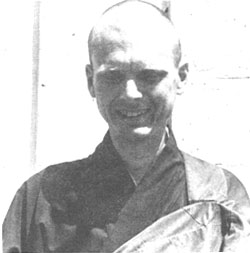|
which
often arose. However, I rebelled early, both emotionally against my
father's restrictions, and intellectually against a religion whose
explanations I found wanting and whose values I found were practiced by
practically none."
After
a turbulent four years of college, Kuo Chi received a Bachelor's in Music.
He describes his experience:
I
always saw the academic world as a big game, but, because I could play
well, I was planning to go to graduate school and eventually seek a
teaching post. However after three years I had an experience, which ended
those plans. I was increasingly aware of the lack of meaning in my
endeavors and was sick of the gross selfishness, which motivated all my
activities. Eventually I came to the conclusion that I should renounce
everything and somehow give myself entirely over to others. I told my
professors I was quitting and invited my friends to take whatever of my
possessions they desired. However, at the time I knew nothing of the
Buddhadharma. I had no formed spiritual values and no worthy models to
follow. Somewhat dazed and not knowing what to do next, I allowed myself
to be talked into finishing school."
After
Kuo Chi finished school he was drafted and went to Canada. He experimented
with altered-consciousness and sense experiences; read books on Eastern
religions; and was "married" for three years. Of this period,
Kuo Chi relates:
"In
these five years of experimentation, I somehow managed to avoid any number
of extremes which could have been disastrous in terms of my being able to
cultivate in this life. It is as though there was special protection as
conditions slowly ripened to the point where I could begin the Bodhisattva
Practice. I own no small debt to my partner in that quasi-marriage who,
when the spiritual path opened for me, did not try to hold to a
relationship we both considered 'ideal,' but rather encouraged me to enter
the Path."
Kuo
Chi entered a "monastery" in Montreal where he was introduced to
the Mahayana Buddhist concept of the Bodhisattva Practice. He studied and
cultivated there for four years until doubts about the qualifications and
teaching methods employed by that teacher caused him to leave for Gold
Mountain Monastery where he sought to study under the Venerable Abbot. Kuo
Chi's evaluation of these four years is as follows:
"These
four years were naturally very important. The teacher I studied with has
been severely criticized by Buddhists and non-Buddhists alike. It was in
fact my own doubts about this teacher, which eventually caused me to leave
that monastic setting. However, I don't feel I can participate in the
discussion of his good or bad points. He is the one who initiated and
nurtured the spiritual development that lead me here, and for that I must
always be grateful, just as I am grateful to my parents whether or not
they might have some shortcomings."
On
Buddha's birthday, 1978, Kuo Chi left the home-life under the Venerable
Abbot Hua and received the Ten Sramanera Precepts and the Ten Major and
Forty-eight Minor Bodhisattva Precepts. Residing now at the City of Ten
Thousand Buddhas, where the precept transmission took place, Kuo Chi is a
regular participant in the Avatamsaka Assembly and in all intensive
sessions held at the City. He is diligently studying Chinese; while also
carrying many of the responsibilities and duties involved 'in the
functioning of Tathagata Monastery, Great Compassion House, Dharma Realm
University, and the City in general. Of his current outlook he concludes:
"Faced
with so much blessing and good fortune in my present life, I am greatly
ashamed of my ignorance and lack of accomplishment. With so many debts of
gratitude, I have no means of repayment save the vow to cultivate the
Bodhisattva Path until all are enlightened." |
